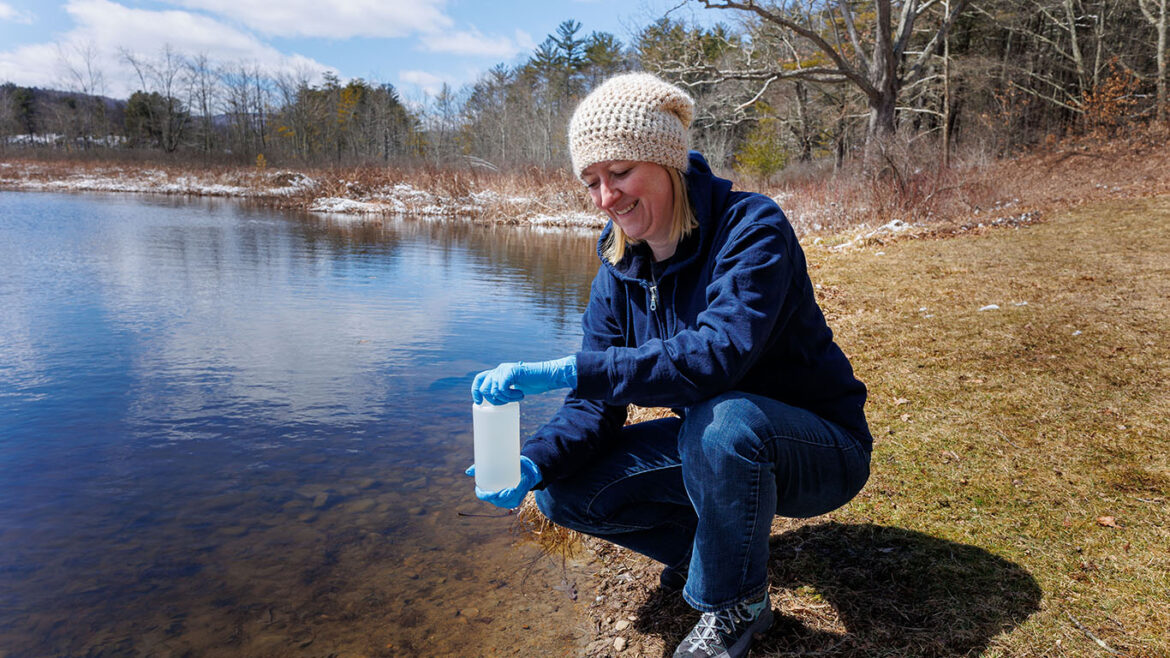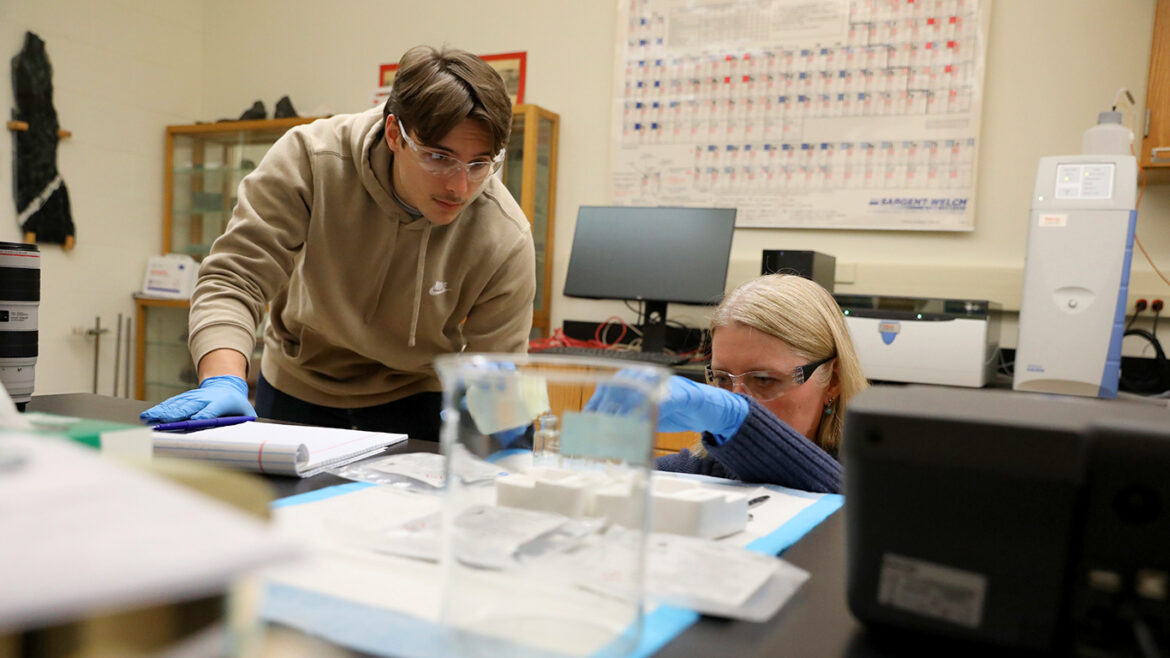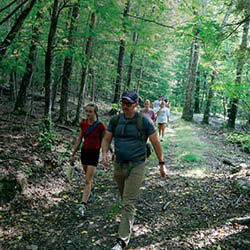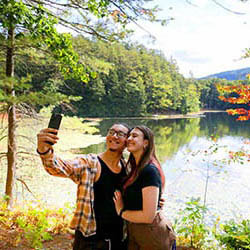Teaching While Caretaking
‘Dr. Z’ guides students on the importance of sustainability and society
by Sakena Washington
Senior Sebastian Stauss is a double-major in environment, sustainability and society, and geology. As part of his thesis, he is researching the health of the Whippany River — a source of drinking water for over a million residents in Morristown, N.J. A Morristown native, Stauss is personally vested in the project, as he investigates human impacts of two potential pollution sources located just meters from the river — a recycling plant and sewage processing plant.
His faculty advisor, Professor of Geology Zsuzanna Balogh-Brunstad — affectionately known as “Dr. Z” — is also the principal investigator on the project.
“With Dr. Z, I am gaining first-hand experience in the field and lab, practicing the methods and skills that can be applied to a career in science,” he said.
Balogh-Brunstad has also worked with Stauss to develop his résumé, research proposals, and identify internships during his undergraduate years. She lives by a simple mantra: “We have to take care of nature because nature takes care of us.”
Giving back is more than her professional code of conduct. It’s a personal ethos that applies to every aspect of her life — from teaching and mentorship to research and sustainability.
Balogh-Brunstad arrived at Hartwick in 2008 with a love for nature tracing back to her childhood in Hungary, where she considered the outside world her safe space. Nestled between the headwaters of Chesapeake Bay and the Susquehanna River Valley, Hartwick’s rural landscape was a natural fit for her.
“When I came to Hartwick, I became interested in the water quality here; the interactions between the biology, soil, and water; and how to grow a healthy ecosystem without fertilizers,” she said.
Balogh-Brunstad earned a bachelor’s degree in mathematics at the University of Pécs and later earned a master’s degree in geography with a certificate in teaching. After immigrating to the United States in 2000, she became a lab technician at Washington State University (WSU), where she analyzed rock and soil samples. It wasn’t long before her supervisor encouraged her to apply to the geology doctorate program at WSU — a large university, where it was easy to feel like a number in lecture halls and across campus.
“That’s one of the reasons I chose Hartwick; it’s a small school and I actually know my students,” she explained.
FROM ROCKS TO WATER
Knowing her students means guiding them with the same compassion and individualized mentorship that she received from her doctoral adviser, who influenced her interest in chemical weathering, the process by which water decomposes rocks and minerals.
“Geology is such a wide field,” she noted. “People think geology is just about rocks, oil companies, or mining. In reality, geology is the study of the earth.”
Geology allows students to explore chemistry, physics, and biology to study the earth’s surface. This interdisciplinary approach soon became the foundation of her teaching practice.
THE REALITY OF CLIMATE CHANGE
During her first years at Hartwick, Balogh-Brunstad taught hydrogeology (the study of groundwater) and environmental geochemistry, but, over time, expanded her course offerings. In 2017, she helped to develop an environment, sustainability, and society major (ENSS).
“We designed that major to be interdisciplinary but also to be flexible,” she reported.
While the ENSS major utilizes courses from different departments, her team created courses specific to this major. One of them, Climate Change, is now in its second year and focuses solely on the role humans play in the climate crisis. In her classroom, the first order of business is understanding that climate change is real.
“I want them to see that climate change impacts their everyday life — the climate extremes, our economy, and our food supply,” she instructed.
Balogh-Brunstad empathizes with her students, who often feel like they don’t have the power to affect change in the environment. But she argues — regardless of our economic status — we all have the power to change things. It starts with our buying power.
“I usually tell students to see where their money goes. Do you need 50 T-shirts? Because the one thing we never really think about is how unsustainable our fashion culture is,” she advised.
MAKING AN IMPACT
Balogh-Brunstad also works with geology, environmental, and chemistry majors, but declaring a major doesn’t always mean students know what they want to do after graduation.
“When first- or second-year students say to me, ‘I’m not sure what I want to do,’ my immediate answer is, ‘Why don’t you take a directed study with me and see if you like lab work? Or fieldwork? And then we can figure out what you like,’” she counsels.
Thanks to this astute guidance, her students possess a unique combination of practical skills and communications savvy that translates well to research methodology and diverse academic and other career paths. Stauss, for example, will share his Whippany River findings at the Northeastern Section Meeting of the Geological Society of America and the Hartwick Student Showcase this spring.
Several alumni attribute their academic and professional success to Dr. Z’s role as their senior advisor and a trusted mentor who continues to support them after they leave Hartwick.
Rebecca Nathan ’19 is one of them. She recently earned a master’s degree in food studies at Chatham University, fueled by her strong undergraduate focus on environmental geology and sustainable agriculture.
“With her encouragement and support, I was able to develop many skills in research methodology, critical thinking, communication, and public speaking that prepared me for graduate school,” Nathan said.
Caitlin Hawley ’17, who majored in geology and minored in environmental science, recalled the positive impact of having a strong female role model — a rarity in the science field.
“I liked how personal [Hartwick] was, especially because Dr. Z. gave me professional advice.”
She added. “For three years in a row, I was one of the students selected to attend the Geological Society of America annual meetings and it really showed me what it was like in the professional world through networking and career opportunities.”
Today, Hawley is an energy rater at Sustainable Comfort, where she consults with clients on the materials used in buildings to create more environmentally sustainable structures.
Brian Redder ’15 embarked on a summer research project with Balogh-Brunstad looking at soil chemistry in Robert V. Riddell State Park near Pine Lake. She taught him how to conduct sample collections, research protocols, and sample analysis techniques that helped make him a candidate for graduate school at Penn State University, where he earned a master’s in forest resources and is working on his Ph.D. in soil science and biogeochemistry.
“I use my scientific expertise to help inform the regulatory process related to clean, safe drinking water at the Association of Metropolitan Agencies in Washington, D.C.” he said.
SUSTAINABILITY ON CAMPUS AND IN THE COMMUNITY
Balogh-Brunstad’s work with local conservation organizations provides paid internships to her students whose projects align with the interests of each organization. Student projects involve monitoring and surveying the local environment, which in turn creates a data repository of the measurable effects of climate change.
Today you can also find her serving on Hartwick’s Sustainability Committee — an initiative launched by President Darren Reisberg composed of faculty and staff. Their first charge is to collect information on the school’s sustainability efforts, including their learning and physical spaces, and identify the most critical areas for improvement.
For her part, Balogh-Brunstad is focused on expanding the curriculum to implement sustainability in general education courses and student life, as well as improving the school’s hiking and biking trails.
“We have 425 acres at Hartwick. So, one of my goals is to make sure that a student doesn’t graduate from Hartwick without walking through this campus. It doesn’t matter what your major is!” she insisted.
Indeed, in many ways, those might be the most valuable steps any student could take.



